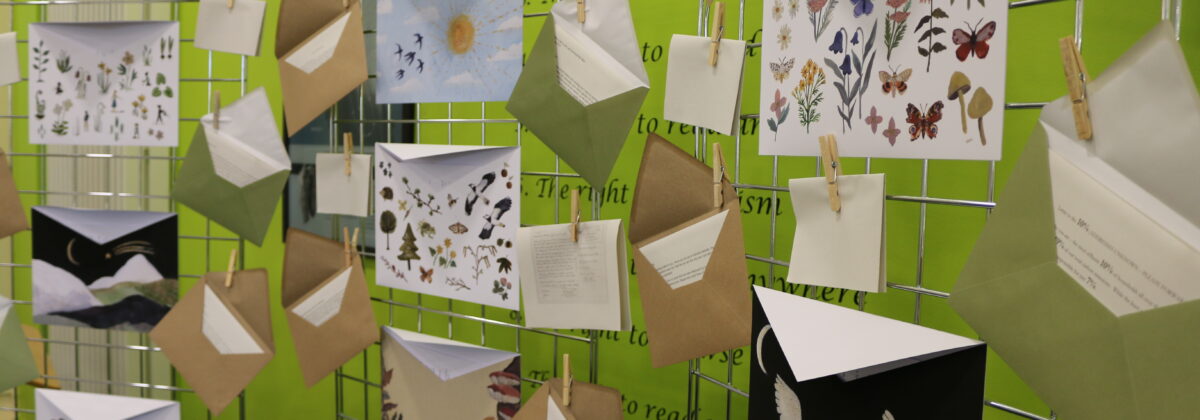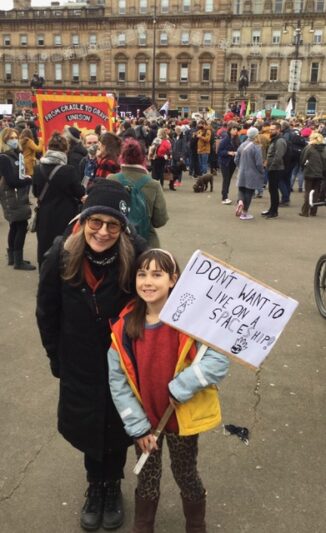The 3.5 percent
The end of 2022 marks the culmination of Linda France’s pioneering climate writing residency with New Writing North and Newcastle University. We’ve taken a moment to reflect on how these past three years have engaged a community of climate writers, thinkers and activists, and to share our hope that other organisations will consider how they can use their own platforms to spark change.

According to a Harvard study, it takes 3.5% of a population to actively engage in non-violent protest in order to guarantee change. Political scientist Erica Chenoweth found that if a certain proportion of society takes part, peaceful demonstration or dissent is historically more effective than violence. And in cases where 3.5% or more of the population have taken part, success has always followed, and change made – be it government policies, leadership u-turns or total over-haul.
That means that in the UK, if we wanted to create meaningful and significant change, we would need 2.3 million people to actively engage in a movement to make that happen. That’s about three times the population of Leeds agreeing to sign the petition or show up on the street to demand that the Climate Emergency is treated with the urgency it requires by our government.
Widespread change can feel like a mammoth task, and as individuals we often we find ourselves asking the question, ‘what meaningful impact can I really have?’.
But 3.5% is still a small minority, and it’s encouraging to let history tell the story of how that minority has never failed to bring about change. Perhaps we can change the world – by changing our part of it.
As Linda France’s climate residency, Writing the Climate, draws to a close, we’ve been reflecting on the way this work has reached people across the North of England and, thanks to an unexpected nudge from the pandemic, well beyond.
As an organisation, one measure of our ‘population’ is the 10,000 people who are active members of our mailing list. Of that number, 3,083 (that’s a massive 31%) engaged with our recent email about the climate residency. Another measure of our audience is the 24,800 people who follow us on Twitter.
More importantly, however, are the 900 people who took part in one of our Writing the Climate activities. That’s 9% of our mailing list or of 3.6% of our Twitter followers, either sending in work for call-outs – from collective poetry to a climate letter installation – or attending regular groups including the Climate Reading Group, The Writing Hour, Listening to the Climate or Starting to Write the Climate.
Many of those people participated more than once, and a good proportion took part on a monthly basis. Perhaps most pleasing are the ‘breakaway groups’ of writers who came together through this programme and continue to meet independently of us to write and discuss issues around the climate.

Not everyone participates by taking part in a project. Linda’s In Our Element podcast series, in which Linda brought poetry into thoughtful dialogue with science and research, had over 1200 listens online, and was also aired on Resonance radio, reaching a further 12,000 pairs of ears. Ed Baxter, CEO of the station, said that the series ‘was a timely and evocative programme with an imaginative and deeply democratic impulse… this was radio about doing, acting – not just about listening.’ And since ‘Murmuration’ first went live on our YouTube channel – a collective sound poem featuring 450 contributors – it’s had a whopping 14,407 views (or 51% of our Twitter followers!).
Looking at these figures, we can’t help but feel optimistic. In 2019, when New Writing North declared a Climate Emergency, we talked about what role we could play as an organisation that wants to see change in the world. What was in our sphere of influence? It was easy to feel small and insignificant in the face of such massive challenges, but as a producer of creative projects, commissioner of new work and owner of a 10,000-strong mailing list, we had more influence than we could afford to waste.
We wanted to start conversations, spark ideas and encourage people to face the Climate Emergency in creative and community-focused ways. The best thing we can do at New Writing North is expand the discussion. We can’t force action, but we might be able to help inspire it, especially with the help of thinkers and writers like Linda France, and so many of the other talented artists we work with.
This autumn, we published a collection of poetry written by Linda during her time as Climate Writer in Residence. Startling has been described as ‘alive to the immensity of the moment… engaging a deep attention towards hope for a future. These poems feel urgent, essential, and will ask their readers to return to them.’ (Sean Borodale). The work was recognised by the inaugural Laurel Prize for eco-poetry, and just last week Linda France was named Environmental Poet of the Year. As a result, Letters to Katłįà was published this month – a pamphlet of her poetic correspondence with a fellow climate-writer-in-residence based in Canada.

Helping to platform the powerful words which have emerged from Linda’s residency feels like vital work, now more than ever. As we reflect on the last few years, and look to our immediate future, we are reminded of how essential expression and creativity will be in the ongoing battle to come.
This year, the world’s population reached 8 billion for the first time. 3.5% of this would be 280 million. An enormous amount, yes, but what if we take it one community at a time? These last three years with Linda have been just the beginning here at New Writing North – and her work is leaving ongoing legacies which will continue to create their own growing ripples.
We’d also like to hope that more climate-writing residencies will be established, and that more organisations will take a look at their communities – at the reach they already have – and think deeply about how they can engage those people.
If all our arts and literature communities in the UK brought 3.5% of their participants to the table, that threshold for real change would feel a lot easier to reach.


